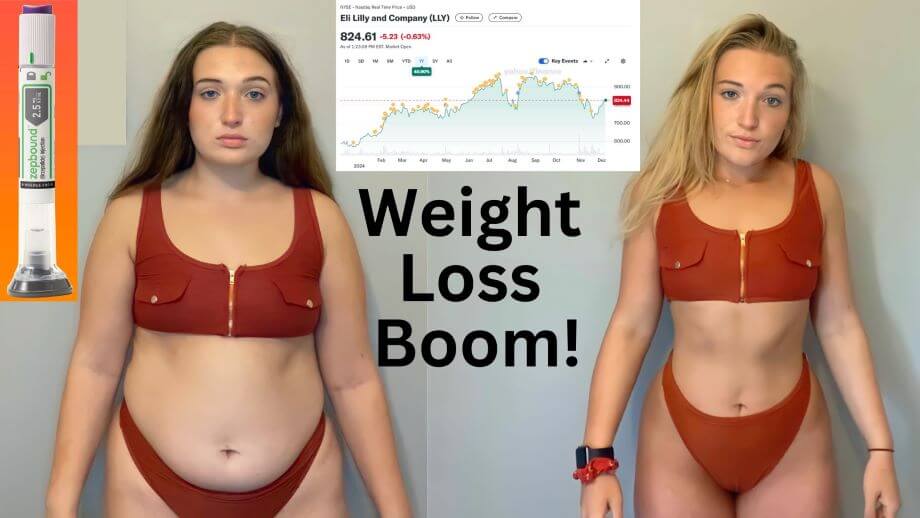The weight loss industry is undergoing a transformation, driven by the development of breakthrough drugs targeting obesity. These medications have not only gained medical and consumer interest but also captured investors’ attention. Key players include Eli Lilly, Novo Nordisk, Pfizer, and smaller biotech firms, all vying for dominance in this lucrative market. Here’s a look at the winners, losers, and factors shaping the industry’s future.
Market Leaders: Eli Lilly and Novo Nordisk
Eli Lilly and Novo Nordisk are the current frontrunners. Novo Nordisk’s Wegovy and Ozempic have set the standard, generating billions in revenue and gaining widespread recognition. Eli Lilly’s response has been formidable, with its new drug Zepbound, approved in 2024, showing superior weight loss efficacy of up to 18% in clinical trials. Zepbound, alongside its diabetes medication Mounjaro (already used off-label for weight loss), positions Eli Lilly as a strong challenger.

Upside for Eli Lilly:
- Zepbound’s promising results and complementary offerings create a compelling portfolio.
- Analysts project Zepbound’s sales to contribute billions annually, driving revenue growth and reinforcing Eli Lilly’s stock performance.

Risks for Novo Nordisk:
- While dominant, Novo Nordisk faces pricing pressures and competition. Additionally, its supply chain struggles have caused temporary market disruptions, opening opportunities for competitors.
Companies Facing Challenges
Pfizer’s withdrawal from clinical trials of its oral GLP-1 receptor agonist due to safety concerns is a setback. While it continues to explore the space, it lags behind Eli Lilly and Novo Nordisk in both drug development and market penetration.
Smaller biotech firms, such as Amgen, are also entering the fray but remain years behind in clinical development. Without significant breakthroughs or partnerships, these companies face an uphill battle to secure market share.
Industries Likely to Suffer
The success of weight loss drugs like Zepbound and Wegovy poses challenges for several industries:
- Diet and Nutrition Companies: Firms offering meal replacement products, weight-loss programs, and dietary supplements may face reduced demand as consumers shift to pharmaceutical solutions with proven efficacy.
- Fitness Industry: Gyms and fitness equipment manufacturers could experience declining revenues if fewer people rely on physical exercise as their primary weight-loss strategy.
- Bariatric Surgery Providers: Hospitals and clinics specializing in surgical weight-loss interventions may see fewer patients as medications offer less invasive alternatives.
- Fast-Food Chains: If weight-loss drugs also lead to sustained behavioral changes, such as reduced caloric intake, fast-food and snack manufacturers might see a decline in sales.
Biggest Upside: Eli Lilly
Eli Lilly appears to have the largest upside potential, thanks to its diversified portfolio of weight-loss and diabetes treatments and its recent approval of Zepbound. The drug’s strong clinical trial results, combined with growing demand for obesity management solutions, could make it a blockbuster.
What Could Derail Growth?
- Competition: Intense rivalry between Novo Nordisk and Eli Lilly could lead to pricing wars, reducing profitability.
- Regulatory Scrutiny: Long-term safety concerns over GLP-1 receptor agonists may lead to stricter regulations, impacting adoption.
- Market Saturation: If too many competitors enter the market, it could dilute growth potential for leading players.
- Patient Accessibility: High costs and limited insurance coverage could hinder widespread adoption, especially in emerging markets.
Conclusion
The weight loss drug market offers substantial opportunities, with Eli Lilly and Novo Nordisk leading the charge. While Eli Lilly’s Zepbound strengthens its position, challenges such as pricing, competition, and regulatory hurdles remain. Investors should closely monitor sales data, clinical outcomes, and market dynamics to navigate this high-growth but competitive landscape effectively.
Previous stock market posts

Leave a Reply